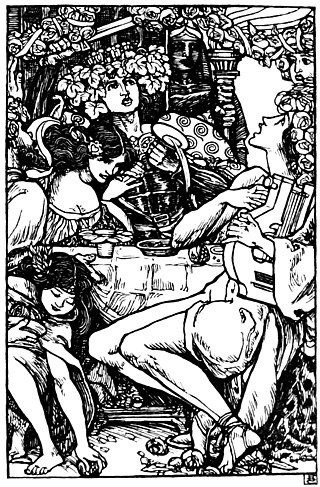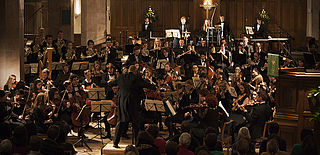Related Research Articles

Saint Cecilia, also spelled Cecelia, was a Roman Christian virgin martyr, who is venerated in Catholic, Orthodox, Anglican, and some Lutheran churches, such as the Church of Sweden. She became the patroness of music and musicians, it being written that, as the musicians played at her wedding, Cecilia "sang in her heart to the Lord". Musical compositions are dedicated to her, and her feast, on 22 November, is the occasion of concerts and musical festivals. She is also known as Cecilia of Rome.
Sea Pictures, Op. 37 is a song cycle by Sir Edward Elgar consisting of five songs written by various poets. It was set for contralto and orchestra, though a distinct version for piano was often performed by Elgar. Many mezzo-sopranos have sung the piece.
The BBC Symphony Chorus is a British amateur chorus based in London. It is the dedicated chorus for the BBC Symphony Orchestra, though it performs with other national and international orchestras.

Sir James Loy MacMillan, TOSD is a Scottish classical composer and conductor.

Chichester Psalms is an extended choral composition in three movements by Leonard Bernstein for boy treble or countertenor, choir and orchestra. The text was arranged by the composer from the Book of Psalms in the original Hebrew. Part 1 uses Psalms 100 and 108, Part 2 uses 2 and 23, and Part 3 uses 131 and 133. Bernstein scored the work for a reduced orchestra, but also made a version for an even smaller ensemble of organ, one harp, and percussion.

The Symphony of Psalms is a choral symphony in three movements composed by Igor Stravinsky in 1930 during his neoclassical period. The work was commissioned by Serge Koussevitzky to celebrate the 50th anniversary of the Boston Symphony Orchestra. The symphony derives its name from the use of Psalm texts in the choral parts.

Spring Symphony is a choral symphony by Benjamin Britten, his Opus 44. The work is scored for soprano, alto and tenor soloists, mixed choir, boys' choir and orchestra. Britten used texts of several poems related to spring, mostly from the 16th and 17th centuries and also one by W. H. Auden. Britten dedicated the work to Serge Koussevitzky and the Boston Symphony Orchestra. The work received its premiere in the Concertgebouw, Amsterdam on 14 July 1949 as part of the Holland Festival
The Leeds Festival Chorus is based in Leeds, West Yorkshire, England. It has 160 singing members in soprano, alto, tenor and bass sections. Presenting classical choral music of a professional standard in Yorkshire and elsewhere, including at the BBC Proms and abroad - for example in Venice. The Chorus is broadcast regularly on BBC Radio 3.

Alexander's Feast is an ode with music by George Frideric Handel set to a libretto by Newburgh Hamilton. Hamilton adapted his libretto from John Dryden's ode Alexander's Feast, or the Power of Music (1697) which had been written to celebrate Saint Cecilia's Day. Jeremiah Clarke set the original ode to music.

"Alexander's Feast, or the Power of Music" (1697) is an ode by John Dryden. It was written to celebrate Saint Cecilia's Day. Jeremiah Clarke set the original ode to music, but the score is now lost.
The Philharmonia Chorus is an independent self-governing symphony chorus based in London, UK. Since its foundation in 1957 the Chorus has given over 900 concerts and made over 100 recordings. The Chorus Master is Gavin Carr.

The Hallé is an English symphony orchestra based in Manchester, England. Since 1996, the orchestra has been resident at the Bridgewater Hall in Manchester.
Roderick Gregory Coleman Williams OBE is a British baritone and composer.

The Edinburgh University Music Society (EUMS) is a student-run musical organisation based in Edinburgh. Since its founding in 1867, the EUMS has been based within the University of Edinburgh.

The Missa Brevis by Leonard Bernstein is a musical setting of parts of the mass ordinary in Latin for a mixed a cappella choir with countertenor solo and percussion. It is also Bernstein's last complete choral work, due to his death a year after its completion in 1989.

Brighton Festival Chorus is a large choir of over 150 amateur singers based in Brighton, UK. One of the country's leading symphony choruses.., and considered "one of the jewels in the city's musical crown", BFC performs in major concert halls throughout Britain and Europe, particularly in Brighton and London.
Quickening is a cantata for countertenor, two tenors, two baritones, children's choir, chorus, and orchestra by the Scottish composer James MacMillan. The work was co-commissioned by The Proms and the Philadelphia Orchestra and was completed in 1998. Its world premiere was performed by the Hilliard Ensemble, the BBC Symphony Orchestra & Chorus, and the Westminster Cathedral Boys' Choir under the direction of Andrew Davis at Royal Albert Hall, London, on 5 September 1999. The journalist Damian Thompson of The Spectator described it as "one of MacMillan's masterpieces."
Symphony No. 5 Le grand Inconnu is a choral symphony by the Scottish composer James MacMillan. The work was commissioned by the Genesis Foundation. It was first performed by the U.K.-based choir The Sixteen, the Genesis Sixteen chamber choir, and Scottish Chamber Orchestra conducted by Harry Christophers in Usher Hall, Edinburgh, on 17 August 2019.
The Christmas Oratorio is an oratorio for soprano, baritone, chorus, and orchestra written in 2019 by the Scottish composer James MacMillan. The work was commissioned by the London Philharmonic Orchestra with support of The Boltini Trust, NTR Zaterdagmatinee, Radio 4's concert series in The Concertgebouw Amsterdam, the Melbourne Symphony Orchestra, and the New York Philharmonic. Its world premiere was given by the soprano Mary Bevan, baritone Christopher Maltman, and the Netherlands Radio Philharmonic & Choir conducted by James MacMillan at the Concertgebouw, Amsterdam, on 16 January 2021.
References
- ↑ "BBC Prom 4 review — Mark Elder steps down from the Hallé with touching Mahler". www.ft.com. Retrieved 2024-07-24.
- 1 2 3 4 5 "James MacMillan - Timotheus, Bacchus and Cecilia". www.boosey.com. Retrieved 2024-07-24.
- ↑ Franks, Rebecca (2024-08-02). "Hallé/Elder review — a fitting finale for Mark Elder's time with the orchestra". www.thetimes.com. Retrieved 2024-08-02.
- ↑ Beale, Robert (2024-06-03). "Hallé, Elder, Bridgewater Hall, Manchester review - a fine and fitting finale for Sir Mark". theartsdesk.com. Retrieved 2024-08-02.
- ↑ "Review: May Festival opens 150th season on a radiant note". www.bizjournals.com. Retrieved 2024-08-02.
- 1 2 "Boosey & Hawkes Performance search". Boosey & Hawkes. Retrieved 2024-08-02.